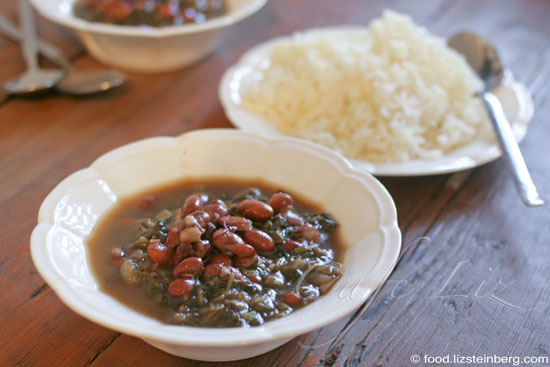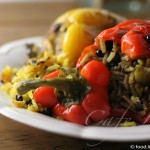
One day when I was feeling particularly stir-crazy, I packed the baby into the carrier and took a bus down to the Levinsky Street market. There, we made our way through the narrow, crowded streets to Salimi, arguably the area’s best little restaurant for Persian food. Just the two of us.
Danny makes an excellent lunch partner. Technically I’m not eating alone, even if he spends the entire meal making eyes at the other customers, slapping at the table and grabbing at my plate, preferably if it’s something that can spill. We’re two people, which means we order enough food for two. And then I eat it all myself, because you can’t let that lovely food go to waste. Right?
Anyway, Salimi is unquestionably the place to go for tart ghormeh sabzi, an herb-based stew dotted with beans and sometimes chunks of stewed beef, as well as gondi, large cardamom-scented balls of chicken and chickpea sitting in a rich golden broth. The place is unpretentious and down-to-business, with crowded formica tables you’ll likely share with other customers. As you sit down, out comes a plate heaping with herbs meant for munching, along with the requisite pickles. And if you only ask, they’ll happily serve your rice with some tahdig — the crunchy layer from the bottom of the pot.
Danny and I split an order of gondi as well as ghormeh sabzi (no meat, since it was mid-afternoon and the meat was gone). Since we were splitting the food, we needed a refill on both broths in order to finish off the rest of our rice. And when I say split, I mean that Danny tasted a bit of gondi and a bit more sabzi, and then chewed on his spoon until it hit the floor and tried to wipe his hands on other people’s shopping bags as I tried my best to eat without getting food on my clothes while holding a squirming baby. The waitress told us that her daughter finished off an entire gondi ball when she was merely 4 months old. I’ll put that story in the urban legend category.
All that set us back a mere 40 shekels. I covered the bill, of course.
Sabzi is a pleasant, thick stew for a chilly winter night, and easily is made meatless. As with many traditional dishes, it seems that no two recipes are the same. In particular, recipes in Hebrew are different than those you’ll find in English, possibly because the latter reflect Iranian Jewish sensibilities as well as the ready availability of fresh herbs in Israel. In fact, some of the best tips can be found in comment section of recipes posted on popular websites, since that’s where all the experienced home cooks have their say, with notes that include making sure to cook the water off the herbs and offering alternatives for the beans (lentils, for instance).
Despite all the variations, the primary flavor components are parsley, cilantro and dried lime — loomi lemon, also called Persian lemon in Hebrew. Meat is definitely not necessary in order to give this dish a rich taste. Since my version is vegan, I bulked it up with spinach and leek (some other recipes use these ingredients, too; other potential ingredients that I didn’t use include mint, scallions, fenugreek leaves and pomegranate molasses). In order to let the ingredients stew slowly, I chopped as I cooked, so the items that went into the pot first cooked for close to an hour.
Served with a side of rice, you have a complete meal — yet another culture’s version of rice and beans.
For 4-6 servings:
- 1 cup kidney beans or another kind of bean, preferably presoaked
- oil for frying
- 1 medium-sized onion (about 250 grams)
- 1 medium leek, both white and green parts (about 250 grams)
- a big Israeli bunch of parsley, without the thickest stems (about 150 grams)
- a big Israeli bunch of cilantro, without the thickest stems (about 150 grams)
- half a bunch of dill, without the thickest stems (about 70 grams)
- half a bunch of Turkish spinach, with stems (or another kind of spinach, also about 250 grams)
- 2 teaspoons salt
- 4 loomi lemons, any seeds removed, 2 of them ground in a spice grinder
- 1/4 teaspoon black pepper
- 1/4 teaspoon cumin
Put your beans in a pot, cover with triple the volume in water and cook until soft — this could be 20-30 minutes in a pressure cooker or 1 hour or more in a regular pot.
All the vegetables and herbs need to be diced. As I noted above, I dice them as I cook, in the order listed above, so that the ingredients that hit the pot first have plenty of time to cook while I’m still working.
Put some oil in a thick-bottomed pot, heat on a medium-low flame, and add the onions (diced). Dice the leek, rinse well to remove any grit, and add to the pot, stirring occasionally.
Remove any coarse stems from the herbs, dice, and add to the pot. Stir occasionally to help the herbs cook down and release their water.
Chop the spinach, add to the pot, and cook until wilted as well.
Add the spices: Crack the loomi lemons, and remove any seeds inside. If you have a coffee or spice grinder, grind two lemons into a powder. Add to the pot, along with the salt, pepper and cumin.
Add 3-4 cups of water to the pot, cover and let simmer for at least 10-15 minutes, so that the flavors seep out from the herbs into the water. This soup improves as it sits, as the flavors become more intense.





